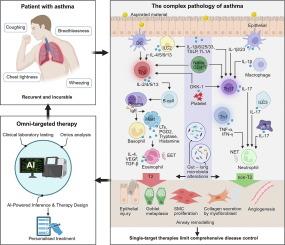突破哮喘治疗瓶颈:全靶向治疗的未来
IF 13
1区 综合性期刊
Q1 MULTIDISCIPLINARY SCIENCES
引用次数: 0
摘要
支气管哮喘是一种复杂的、高度异质性的疾病,涉及多种病理机制和炎症途径。传统的药物治疗,包括糖皮质激素、白三烯调节剂、β2-肾上腺素能激动剂和毒蕈碱拮抗剂,以及新的靶向生物制剂可以缓解症状并防止急性加重;然而,实现临床缓解或治愈仍然是一个主要挑战。综述目的:系统概述哮喘的定义、流行病学及多因素发病机制;结合临床试验和针对性干预的最新进展,探索潜在的治疗靶点;并强调发展基于个性化诊断的多靶点(“全靶点”)联合策略,可能由人工智能(AI)指导,以改善哮喘控制、临床结果和恶化率,并着眼于最终治愈。我们提出,目前的治疗困境在很大程度上反映了单靶点治疗无法解决个体的多种致病途径。相反,多靶点、个性化的策略可以同时、精确地调节多种病理通路。实现这些战略将需要人工智能支持的指导,精确识别个体致病机制,以及进一步开发靶向治疗。本文章由计算机程序翻译,如有差异,请以英文原文为准。

Breaking the bottleneck of asthma treatment: the future of omni-targeted therapy
Background
Bronchial asthma is a complex, highly heterogeneous disease involving multiple pathological mechanisms and inflammatory pathways. Traditional pharmacotherapies, including glucocorticoids, leukotriene modifiers, β2-adrenergic agonists, and muscarinic antagonists, and new targeted biologics can alleviate symptoms and prevent acute exacerbations; however, achieving clinical remission or a cure remains a major challenge.Aim of review
To systematically outline the definition, epidemiology, and multifactorial pathogenesis of asthma; to explore potential therapeutic targets incorporating the latest advances from clinical trials and targeted interventions; and to emphasize the development of multi-target (“omni-targeted”) combination strategies based on individualized diagnosis, potentially guided by artificial intelligence (AI), to improve asthma control, clinical outcomes, and exacerbation rates, with an eye toward a definitive cure.Key scientific concepts of review
We propose that the current therapeutic dilemma largely reflects the inability of single-target therapies to address an individual’s multiple pathogenic pathways. In contrast, multi-target, personalized strategies can modulate diverse pathological pathways simultaneously and precisely. Realizing these strategies will require AI-enabled guidance, precise identification of individual pathogenic mechanisms, and further development of targeted therapeutics.求助全文
通过发布文献求助,成功后即可免费获取论文全文。
去求助
来源期刊

Journal of Advanced Research
Multidisciplinary-Multidisciplinary
CiteScore
21.60
自引率
0.90%
发文量
280
审稿时长
12 weeks
期刊介绍:
Journal of Advanced Research (J. Adv. Res.) is an applied/natural sciences, peer-reviewed journal that focuses on interdisciplinary research. The journal aims to contribute to applied research and knowledge worldwide through the publication of original and high-quality research articles in the fields of Medicine, Pharmaceutical Sciences, Dentistry, Physical Therapy, Veterinary Medicine, and Basic and Biological Sciences.
The following abstracting and indexing services cover the Journal of Advanced Research: PubMed/Medline, Essential Science Indicators, Web of Science, Scopus, PubMed Central, PubMed, Science Citation Index Expanded, Directory of Open Access Journals (DOAJ), and INSPEC.
 求助内容:
求助内容: 应助结果提醒方式:
应助结果提醒方式:


